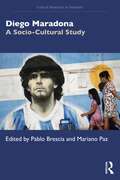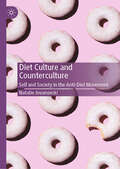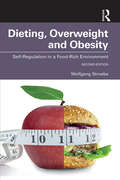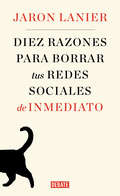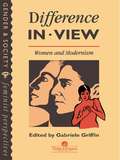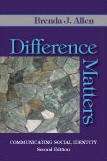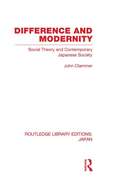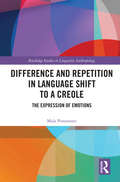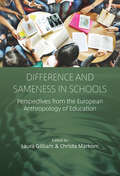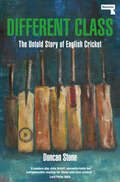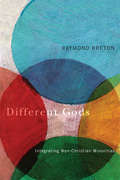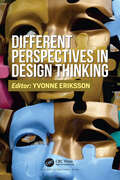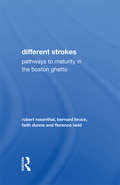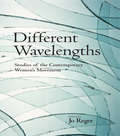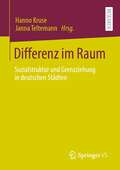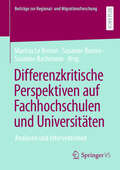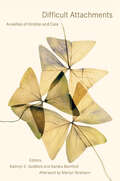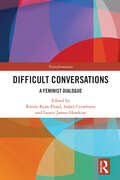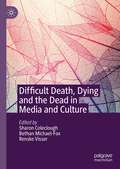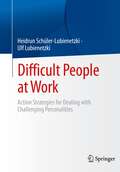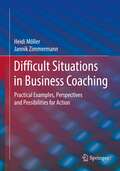- Table View
- List View
Die „Unsichtbaren“ im Schatten der Gesellschaft - Forschungen zur Wohnungs- und Obdachlosigkeit am Beispiel Dortmund
by Dierk Borstel Tim Sonnenberg Stephanie SzczepanekObdachlosigkeit ist einer der schlimmsten persönlichen Schicksalsschläge in unserer Wohlstandsgesellschaft, und es gibt sie in jeder Stadt. Als Gegenstand sozialwissenschaftlicher Forschung ist Obdachlosigkeit aber dennoch unentdeckt. Die vorliegende Studie nähert sich dem Phänomen theoretisch wie empirisch.
Diego Maradona: A Socio-Cultural Study (Critical Research in Football)
by Pablo Brescia Mariano PazThis is the first book in English to closely examine the life of Diego Maradona from socio-cultural perspectives, exploring how his status as an icon, a popular sporting hero, and a political figurehead has been culturally constructed, reproduced, and manipulated. The volume looks at representations of Maradona across a wide variety of media, including literature, cinema, popular music, printed and online press, and radio, and in different countries around the world, to cast new light on topics such as the instrumentality of sporting heroes and the links among sport, nationalism, and ideology. It shows how the life of Maradona – from his origins in the barrio through to his rise to god-like status in Naples and as a postcolonial symbol of courage and resistance against imperial powers across the global south, alongside scandal and his fall from grace – powerfully illustrates themes such as the dynamics of gender, justice, and affect that underpin the study of sport, culture, and society. This is essential reading for anybody with an interest in football, sport studies, media studies, cultural studies, or sociology.
Diesseits und jenseits der Ökonomie: Kurzsichtige Krisenverwaltung oder weitsichtiger Neuanfang
by E. W. KüppersWeltwirtschaftskrisen sind immer auch Gesellschaftskrisen! Treibende ökonomische Kräfte verfolgen als »homo oeconomicus« rücksichtslos isoliert exzessive Wachstumsziele mit einem skurrilen Tanz ums »goldene BIP-Kalb« – auf Kosten aller anderen Gesellschaftsinteressen und unter Inkaufnahme massiver Umweltzerstörungen. Das Paradoxe dabei ist, dass sich die Ökonomie amüsanterweise als naturwissenschaftlich geprägt sieht, obwohl sie zutiefst den Sozialwissenschaften zuzurechnen ist. Der scheinbar unaufhaltsame Trend einer diesseitigen Ökonomie erfordert angesichts sich häufender sozialer und ökologischer Probleme einen einschneidenden Richtungswechsel. Dieser kann nur darin bestehen, dass eine jenseitige Ökonomie die Interessen aller Gesellschaftsteinehmer, im engen Verbund mit dem Erhalt unserer natürlichen Lebensgrundlage stärkt und fördert. Während eine diesseitige (mono)kausale Ökonomie konfliktträchtige Ziele verfolgt, ist eine jenseitige Ökonomie geprägt durch eine vorausschauende systemische Perspektive nachhaltiger gesellschaftlicher Weiterentwicklung.
Diet Culture and Counterculture: Self and Society in the Anti-Diet Movement
by Natalie JovanovskiThis book is the first of its kind to explore how women challenge the powerful sociocultural and gendered phenomenon of diet culture across the broad anti-diet movement and beyond. Showcasing the voices of over 150 everyday women, activists, and health professionals across Australia, New Zealand, Canada, the United States and the United Kingdom, the author provides new insight into anti-diet practices while giving agency for women who remain main targets of diet culture. Using Pierre Bourdieu’s concept of habitus as a novel starting point to develop a concept of the diet habitus, the author explores the possibility of a fragmented but unified diet counterculture. Drawing on feminist perspectives from women’s and fat liberation movements, the author demonstrates that women’s anti-diet practices are grounded in a combination of self and society; one that has the power to significantly re-shape the broad landscape of food and eating for women. This international book appeals to scholars, students, activists and health professionals interested in the intersections of the sociology of the body, fat studies, sociology of food and nutrition, social movements, health sociology, and women's studies.
Dieting, Overweight and Obesity: Self-Regulation in a Food-Rich Environment
by Wolfgang StroebeWhy do so many people become overweight and obese and why do they find it so difficult to lose weight? In this second edition of his influential book on Dieting, Overweight and Obesity, Wolfgang Stroebe – who developed the goal conflict model of eating – explores the physiological, environmental and psychological influence on weight gain and examines how these processes are affected by genetic factors. Like the first edition, the book takes a social-cognitive approach to weight regulation and discusses how exposure to environmental cues can set-off overeating in chronic dieters. In addition to extensively revising and updating the chapters of the first edition, this second edition features three new chapters. The chapter on successful restrained eating reviews personality factors as well as recent experimental research on impulse control. The chapters on psychological treatment of obesity and on primary prevention describe and evaluate the various treatment and prevention approaches and the research conducted to assess their efficacy. This book is essential reading for students, researchers and clinicians interested in an up-to-date review of the field of eating research and a new theoretical approach to the study of overweight and obesity.
Diez razones para borrar tus redes sociales de inmediato
by Jaron LanierUn brillante manifiesto que llama a la acción para comenzar a reinventar Internet. ¿Te cuesta imaginar una vida sin redes sociales? ¿Y si te dieran 10 argumentos explicando la toxicidad de sus efectos? En este libro, Jaron Lanier nos explica con una contundencia abrumadora como las redes sociales, al desplegar una vigilancia constante y manipular el inconsciente de sus usuarios, nos están convirtiendo en personas rencorosas, tristes, asustadizas, poco empáticas, aisladas y triviales. Si quieres una vida más feliz, un mundo más justo y pacífico, o simplemente la oportunidad de pensar por ti mismo sin ser monitoreado e influenciado por las corporaciones más ricas de la historia, lo mejor que puedes hacer es cancelar tus cuentas. Ahora. Reseñas:«Jaron Lanier es un genio.»Sunday Times «Mezcla sabiduría profética con una simple practicidad. Lectura esencial.»The New York Times «El título lo dice todo... Lanier aboga por desanclarse de las redes sociales, que fomentan la adicción y la anomia y en general nos hacen sentir peor y más temerosos el uno del otro y del mundo. El experimento podría ser útil, aunque oscurecerá los corazones de los señores oscuros, un argumento ganador por sí mismo.»Kirkus Reviews
Difference In View: Women And Modernism (Gender And Society Ser.)
by Gabriele GriffinThis collection of essays challenges conceptions of "high" modernism, its preoccupation with style at the expense of issues such as race, class and gender, and its exclusive focus both on predominately male writers, poetry and prose fiction by highlighting the diversity of cultural production in the modernist period. This book focusses specifically on women's cultural production, covering a wide range of arts and genres including chapters on painting, theatre, and magazines. The book investigates how women usually constructed as "others", themselves construct others in their work in a period prominently concerned with the construction of self as an issue. This diversity offers a new format of reading modernism in a cross-disciplinary context.
Difference Matters: Communicating Social Identity (Second Edition)
by Brenda J. AllenAllen's proven ability and flare for presenting complex and oftentimes sensitive topics in nonthreatening ways carry over in the latest edition of Difference Matters. Her down-to-earth analysis of six social identity categories reveals how communication establishes and enacts identity and power dynamics. She provides historical overviews to show how perceptions of gender, race, social class, sexuality, ability, and age have varied throughout time and place. Allen clearly explains pertinent theoretical perspectives and illustrates those and other discussions with real-life experiences (many of which are her own). She also offers practical guidance for how to communicate difference more humanely. While many examples are from organizational contexts, readers from a wide range of backgrounds can relate to them and appreciate their relevance. The second edition includes updated statistics, recent research, and examples from contemporary events in the United States.
Difference and Modernity: Social Theory and Contemporary Japanese Society (Routledge Library Editions: Japan)
by John ClammerThe question of ‘postmodernity’ that has swept Western academic and intellectual circles raises critical comparative questions. Do societies that have not experienced the same historical development as the West pass inevitably through modernity into postmodernity, or can they skip such stages altogether? Japan, the only non-Western society to develop independently a fully-fledged capitalist-industrialist economy, poses such fundamental questions to social theory. Is Japan in fact ‘unique’ and as such is it a society which escapes the net of conventional sociological abstractions? The book questions how special Japanese society really is, the limitations of Western social theory in grasping the fullness of this dynamic and a complex Asian society, and inquires as to how Japan in turn may speak to social theory and deepen and broaden the principles on which social theory attempts to explore and categorize the social and cultural worlds.
Difference and Repetition in Language Shift to a Creole: The Expression of Emotions (Routledge Studies in Linguistic Anthropology)
by Maïa PonsonnetIn today’s global commerce and communication, linguistic diversity is in steady decline across the world as speakers of smaller languages adopt dominant forms. While this phenomenon, known as ‘language shift’, is usually regarded as a loss, this book adopts a different angle and addresses the following questions: What difference does using a new language make to the way speakers communicate in everyday life? Can the grammatical and lexical architectures of individual languages influence what speakers express? In other words, to what extent does adopting a new language alter speakers’ day-to-day communication practices, and in turn, perhaps, their social life and world views? To answer these questions, this book studies the expression of emotions in two languages on each side of a shift: Kriol, an English-based creole spoken in northern Australia, and Dalabon (Gunwinyguan, non-Pama-Nyungan), an Australian Aboriginal language that is being replaced by Kriol. This volume is the first to explore the influence of the formal properties of language on the expression of emotions, as well as the first description of the linguistic encoding of emotions in a creole language. The cross-disciplinary approach will appeal to linguists, psychologists, anthropologists and other social scientists.
Difference and Sameness in Schools: Perspectives from the European Anthropology of Education (EASA Series #48)
by Laura Gilliam and Christa MarkomPresenting European Anthropology of Education through eleven studies of European schools, this volume explores the constructing and handling of difference and sameness in the central institutions of schools. Based on ethnographic studies of schools in Greece, England, Norway, Italy, Switzerland, the Czech Republic, Spain, Austria, Russia, Germany, the Netherlands and Denmark, it illustrates how anthropological studies of schools provide a window to larger society. It thus offers insights into cultural lessons taught to children through policies, institutional structures and everyday interactions, as well as into schools’ entanglement in state projects, cultural processes, societal histories and conflicts, and hence into contemporary Europe.
Different Class: The Untold Story of English Cricket
by Duncan StoneIn telling the story of cricket from the bottom up, Different Class demonstrates how the "quintessentially English" game has done more to divide, rather than unite, the English.In 1963, the West Indian Marxist C.L.R. James posed the deceptively benign question: "What do they know of cricket, who only cricket know?"A challenge to the public to re-consider cricket and its meaning by placing the game in its true social, political and economic context, James was, all too subtly, attempting to counter the game&’s orthodox history that, he argued, had played a key role in the formation of national culture. As a consequence, he failed, and the history of cricket in England has retained the same stresses and lineaments as it did a century ago — until now.In examining recreational rather than professional (first-class) cricket, Different Class does not simply challenge the widely accepted orthodoxy of English cricket, it demonstrates how the values and belief systems at its heart were, under the guise of amateurism, intentionally developed in order to divide the English along class lines at every level of the game. If the creation of opposing class-based cricket cultures in the North and South of England grew out of this process, the institutional structures developed by those in charge of English cricket continue to discriminate. But, as much as the exclusion of Black and South Asian cricketers from the recreational mainstream is the most obvious example, it is social class that remains the greatest barrier to participation in what used to be the national game.
Different Gods
by Raymond BretonIn recent decades the ebb and flow of immigration to Canada has changed significantly, with the majority of immigrants coming from non-European countries. A striking feature of this shift is that a significant proportion of immigrants are non-Christians newly immersed in a society entrenched in Christian ideals. In Different Gods, Raymond Breton looks at the significance of religious differences and what they mean for immigrants, non-immigrants, and Canada's future. Breton examines the evolution over time of the religious attitudes and behaviour of the new minorities and the challenges that their presence poses to the receiving society. The analysis consists of a review of recent research and formulates possible conclusions about the transformations that integration may bring about for both the minorities and the receiving society. An important analysis of immigration in an era of rapidly changing social values, Different Gods looks boldly into issues of collective identity and cultural accommodation.
Different Gods: Integrating Non-Christian Minorities into a Primarily Christian Society
by Raymond BretonIn recent decades the ebb and flow of immigration to Canada has changed significantly, with the majority of immigrants coming from non-European countries. A striking feature of this shift is that a significant proportion of immigrants are non-Christians newly immersed in a society entrenched in Christian ideals. In Different Gods, Raymond Breton looks at the significance of religious differences and what they mean for immigrants, non-immigrants, and Canada's future. Breton examines the evolution over time of the religious attitudes and behaviour of the new minorities and the challenges that their presence poses to the receiving society. The analysis consists of a review of recent research and formulates possible conclusions about the transformations that integration may bring about for both the minorities and the receiving society. An important analysis of immigration in an era of rapidly changing social values, Different Gods looks boldly into issues of collective identity and cultural accommodation.
Different Perspectives in Design Thinking
by Yvonne ErikssonGlobalization and digitalization are buzz words in contemporary society. They affect both our private and our professional lives. Society has become more diverse with easier access to information and to virtual platforms that gives us opportunity to be in touch with colleagues, friends, family, etc. at any time. A complex environment is emerging wherein internet of things and big data are being integrated with products, production systems, healthcare, and daily activity and play an important part in decision making. This has an impact on future designs and the role of designers. Responsible designers with a holistic perspective are needed.The book highlights several aspects of design thinking such as Information Design and Critical Design. The meaning of culture, gender and disabilities are also discussed. The functions of Information Design are changing from ‘showing the way’, instruction manuals and graphic design. It will affect among others, healthcare technology, smart products and Industry 4.0. Design thinking perspective that includes users from the entire chain and from the producer to the end user of the product or service, is needed. This will also require gender and culture issues to be taken into consideration in designing products and services. Design thinking methods and critical aspects of design will contribute to an inclusive society.
Different Strokes: Pathways to Maturity in the Boston Ghetto
by Robert RosenthalThis book describes the Pathways project that traces the individual development of several black young men from poor families who grew up in the Roxbury/North Dorchester ghetto from 1967 to 1974. It is about aspects of self-perception and identity, and resources and pathways to reach goals.
Different Wavelengths: Studies of the Contemporary Women's Movement
by Jo RegerThe original essays in this collection ground the shifting terrain of feminism in the 21st century. The contributors define and examine the complexity of the Third Wave by answering questions like: how appropriate is a "third wave" label for contemporary feminism; are the agendas of contemporary feminism and the "second wave" really all that different; does the wave metaphor accurately describe the difference between contemporary feminists and their predecessors; how do women of color fit into this notion of contemporary feminism; and what are the future directions of the feminist movement?
Differenz im Raum: Sozialstruktur und Grenzziehung in deutschen Städten
by Hanno Kruse Janna TeltemannSoziale Grenzziehungen prägen das Zusammenleben in Städten. Wie diese Einsicht in der quantitativen Stadtsoziologie berücksichtigt werden kann, thematisiert dieser Sammelband. Beispielhaft vermitteln dessen Beiträge die Bedeutung von gruppen- und raumbezogener Kategorisierung für die Analyse räumlicher Sozialstruktur. Anhand verschiedener empirischer Studien zu Ausmaß, Ursachen und Konsequenzen von Segregation und räumlicher Ungleichheit liefern sie gleichzeitig eine Bestandsaufnahme räumlicher Differenz in Deutschland.
Differenzierung im Wirtschaftsunterricht: Eine qualitative Delphi-Studie zu Chancen und Hürden
by Christoph HertrichChristoph Hertrich untersucht in dieser Studie die Chancen und Hürden einer Differenzierung im Wirtschaftsunterricht. Auf Basis einer Delphi-Experten-Befragung identifiziert er domänenspezifische und überfachliche Aspekte, die bei der Konzeption von differenzierenden Lehr-Lernarrangements berücksichtigt werden sollten. Damit wird ein zentraler Beitrag zur Unterrichtsforschung im Bereich der ökonomischen Bildung geleistet, der zugleich wertvolle Impulse für die Praxis liefert.
Differenzkritische Perspektiven auf Fachhochschulen und Universitäten: Analysen und Interventionen (Beiträge zur Regional- und Migrationsforschung)
by Susanne Bachmann Maritza Le Breton Susanne BurrenZiel dieses Sammelbands ist es, historisch-theoretische, empirische und handlungsbezogene Zugänge zu Differenzkonstruktionen und (Un-)Gleichheiten sowie Diversitätsorientierung an (Fach-)Hochschulen und deren bildungspraktische Relevanz und Spannungsfelder aus kritisch-dekonstruktiver, postkolonialer und intersektionaler Perspektive zu beleuchten - dies mit Bezug auf aktuelle Diskurse über Diversität im Hochschulkontext, die eher an Ansätze der betriebswirtschaftlichen Organisationsentwicklung ausgerichtet sind. So kann Diversity-Management unter Beachtung hochschulinterner Diversitätsleitsätze soziale Positionierungen festschreiben, wodurch eine Re-Essentialisierung stattfinden kann. Eine Betrachtungsweise im Sinne einer kritischen, emanzipatorischen und antidiskriminierenden Perspektive, welche soziokulturelle Bedingungen von Studierenden und Mitarbeitenden an (Fach-)Hochschulen berücksichtigt, ist hingegen selten anzutreffen. Im Fokus alternativer Ansätze steht eine differenzreflexive Hochschule, welche auf die Dekonstruktion von natürlich erscheinenden Differenzlinien zielt, mit der Absicht, nicht nur essentialistische Diskurse zu hinterfragen, sondern auch eine Veränderung der darin eingebundenen geschlechts-, disziplin- und generationenspezifischen Habitusformen zu bewirken.
Difficult Attachments: Anxieties of Kinship and Care
by Marilyn Strathern Sandra Bamford Michael Lambek Jason Danely Deborah A. Boehm Danilyn Rutherford Katie Kilroy-Marac Julia Kowalski Kathryn E. Goldfarb Janelle S. Taylor Celeste Pang Noa Vaisman Erika Finestone Dawa Lokyitsang Riché J. Barnes Patrick McKenzie Brady G’Sell Sonia Yuhui ZhangAnthropologists have long considered kinship as the basis for social solidarity. Indeed, the idea that kinship is grounded in positive sociality has found its way into most anthropological accounts and has served as an orienting framework directing decades of scholarly research. But what about when it is not? What about instances when kinship is anything but ‘warm and fuzzy’ but is characterized, instead, by neglect, violence, negative affect, or a lack of nurturance and care? In the three interlinked sections of this volume, the view that kinship is about “solidarity” and “care” is challenged by exploring how kin relations are not only about connection and inclusion but also about disconnection, exclusion, neglect, and violence. Kinship relationships that feel “positive” and “good” take a great deal of perseverance and work; there is nothing “natural” about kinship ties as being based on positive sociality. In these chapters, the contributors take seriously the contingency of kinship relations (the moments when kinship breaks down or is a source of suffering) and how this prompts scholars to develop new theoretical and methodological perspectives.
Difficult Conversations: A Feminist Dialogue (Transformations)
by Isabel Crowhurst Róisín Ryan-Flood Laurie James-HawkinsThis book explores ‘difficult conversations’ in feminist theory as an integral part of social and theoretical transformations. Focusing on intersectionality within feminist theory, the book critically addresses questions of power and difference as a central feminist concern. It presents ethical, political, social, and emotional dilemmas while negotiating difficult conversations, particularly in terms of sexuality, class, ‘race’, ethnicity and cross-identification between the researcher and researched. Topics covered include challenging cultural relativism; queer marginalisation; research and affect; and feminism and the digital realm. This book is aimed primarily at students, lecturers and researchers interested in epistemology, research methodology, gender, identity, and social theory. The interdisciplinary nature of the book is aimed at reaching the broadest possible audience, including those engaged with feminist theory, anthropology, social policy, sociology, psychology and geography.
Difficult Death, Dying and the Dead in Media and Culture
by Sharon Coleclough Bethan Michael-Fox Renske VisserThis book responds to a growing interest in death, dying and the dead within and beyond the field of death studies. The collection defines an understanding of ‘difficult death’ and examines the differences between death, dying and the dead, as well as exploring the ethical challenges of researching death in mediated form. The collection is attendant to the ways in which difficult deaths are imbricated in power structures both before and after they become mediatised in culture. As such, the work navigates the many political and social complexities and inequalities – what might be deemed the difficulties – of death, dying and the dead. The book seeks to expand understandings of the difficulty of death in media and culture through a wide range of chapters from different contexts focused on literature, film, television, and in online environments, as well as several chapters examining news reportage of difficult deaths.
Difficult People at Work: Action Strategies for Dealing with Challenging Personalities
by Heidrun Schüler-Lubienetzki Ulf LubienetzkiThis book helps professionals deal with difficult or even dangerous colleagues, employees or superiors. Some people poison the working atmosphere, make other people ill and cost their companies a lot of money. Often the cause lies in a psychological disorder, we are then often dealing with narcissists or psychopaths, but usually the destructive behavior is not (yet) based on a psychological disorder. This book introduces a collective term for such people - it calls them "toxic people" - and helps both those affected and those responsible in companies and organizations to recognize them, to protect themselves and others from them, and to take promising action against them. In addition to information on the typical characteristics of "toxic people," their motives are explained and concrete strategies for action and examples of tried-and-tested assistance are provided. A new chapter provides vivid, exciting case studies from real-life situations. A book for managers and those affected as well as personnel developers, trainers, consultants and coaches in companies and organizations.This book is a translation of the original German 2nd edition Schwierige Menschen am Arbeitsplat by Heidrun Schüler-Lubienetzki and Ulf Lubienetzki, published by Springer-Verlag GmbH Germany, part of Springer Nature in 2017. The translation was done with the help of artificial intelligence (machine translation by the service DeepL.com). A subsequent human revision was done primarily in terms of content, so that the book will read stylistically differently from a conventional translation. Springer Nature works continuously to further the development of tools for the production of books and on the related technologies to support the authors.
Difficult Situations in Business Coaching: Practical Examples, Perspectives and Possibilities for Action
by Heidi Möller Jannik ZimmermannCoaches encounter a range of situations in their professional practice that they experience as difficult. The challenges have different sources. They can come from the coaches themselves, the coachees or the commissioning organization. But how do these situations present themselves in detail? How can coaches understand them and respond appropriately? Using real case studies collected online, this book takes a closer look at difficult situations. In doing so, renowned coaches present for discussion their theoretical and methodological perspectives and their recommendations for action. This book is a translation of the original German 1st edition Schwierige Situationen im Business-Coaching by Heidi Möller and Jannik Zimmermann, published by Springer Fachmedien Wiesbaden GmbH, part of Springer Nature in 2020. The translation was done with the help of artificial intelligence (machine translation by the service DeepL.com). A subsequent human revision was done primarily in terms of content, so that the book will read stylistically differently from a conventional translation. Springer Nature works continuously to further the development of tools for the production of books and on the related technologies to support the authors.

